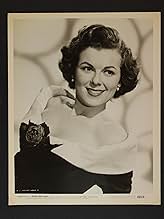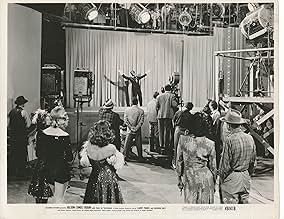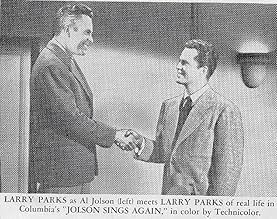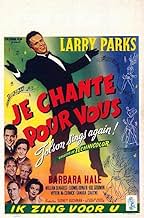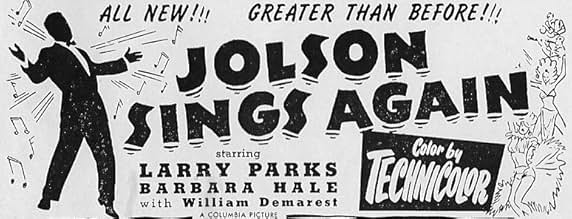अपनी भाषा में प्लॉट जोड़ेंIn this sequel to "The Jolson Story", we pick up the singer's career just as he has returned to the stage after a premature retirement. However, his wife has left him and the appeal of the s... सभी पढ़ेंIn this sequel to "The Jolson Story", we pick up the singer's career just as he has returned to the stage after a premature retirement. However, his wife has left him and the appeal of the spotlight is not what it used to be. This time Jolson trades in the stage for life in the f... सभी पढ़ेंIn this sequel to "The Jolson Story", we pick up the singer's career just as he has returned to the stage after a premature retirement. However, his wife has left him and the appeal of the spotlight is not what it used to be. This time Jolson trades in the stage for life in the fast lane: women, horses, travel. It takes the death of Mama Yoelson (Tamara Shayne) and Wo... सभी पढ़ें
- 3 ऑस्कर के लिए नामांकित
- 4 जीत और कुल 5 नामांकन
- Cantor Yoelson
- (गाने की आवाज)
- Headwaiter
- (बिना क्रेडिट के)
- Writer
- (बिना क्रेडिट के)
- Soldier
- (बिना क्रेडिट के)
- Bing Crosby
- (वॉइस)
- (बिना क्रेडिट के)
- Self - Accordionist
- (बिना क्रेडिट के)
- Sound Mixer
- (बिना क्रेडिट के)
- Mr. Estrada
- (बिना क्रेडिट के)
फ़ीचर्ड समीक्षाएं
In the opening of this sequel, Jolson (Parks) returns home to find Julie has packed up her bags and is gone for good. He searches for her, only to find that she has divorced him. With the advent of World War II, Jolson returns to show business by entertaining the troops overseas. During this time he finds sadness with the death of first his mother (Tamara Shayne), and later his father (Ludwig Donath). Jolson continues to be a trooper and perform whenever and wherever he's needed, but due to overwork and little rest, he collapses during a performance. He is later nursed back to health by Ellen Clark (played by Barbara Hale, based on Jolson's fourth wife, Erle Galbraith, an X-ray technician), whom he soon marries. In spite of his great showmanship, Jolson faces a setback in his career, receiving no offers and finding himself passed over by a newer generation of singers, like Bing Crosby or Frank Sinatra. When Jolson gets a chance to appear in an all-star benefit, his name is not among the many stars listed in the program, thus coming in last to sing one song to a half empty theater. Jolson's song captures the attention of Colonel Ralph Bryant (Myron McCormick), an avid fan who had previously met Jolson during his war tour. Now a movie producer, he stumbles upon an idea in producing a motion picture based on the life of the great Jolson, a big gamble that would soon pay off.
A half hour shorter than its predecessor, JOLSON SINGS AGAIN, at 96 minutes, fails to disappoint when it comes to bringing back many of the old Jolson songs, as before, sung by the real Jolson but lip-sync by Larry Parks. The soundtrack is as follows: "Rockabye Your Baby With a Dixie Melody," "Is It True What They Say About Dixie?" "For Me and My Gal," "Kol Nidre" (traditional Jewish prayer); "Back in Your Own Back Yard," "I'm Looking Over a Four-Leaf Clover," "When the Red-Red Robin Comes Bob-Bob Bobbin' Along," "Give My Regards to Broadway," "Chinatown My Chinatown," "I'm Just Wild About Harry," "Baby Face," "After You've Gone," "I Only Have Eyes For You," "Sonny Boy," "Toot-Toot Tootsie, Goodbye," "California, Here I Come," "California, Here I Come" (reprise); "You Made Me Love You," "Let Me Sing and I'm Happy," "My Blushin' Rosie," "Mammy," "The Spaniard Who Blighted My Life," "California, Here I Come" (reprise); "About a Quarter to Nine," "The Anniversary Song," "Waiting for the Robert E. Lee," "April Showers," "Pretty Baby," "Carolina in the Morning," and "Rockabye Your Baby With a Dixie Nelody" (reprise, finale). As many songs heard in this and the previous Jolson story, it is evident there are more songs to go around that never made it to the final print.
Other than William Demarest and Bill Goodwin reprising their roles as Steve Martin and Tom Baron, the supporting players include: Robert Emmett Keane, Eric Wilton, Martin Garralaga and Larry Parks. Yes, Larry Parks! Parks is the star in this production playing Al Jolson, but he also appears as himself during the Hollywood sequence where Jolson meets Larry Parks prior to the production of THE JOLSON STORY. Barbara Hale as Jolson's new and younger wife, is extremely likable. Unlike the Julie character, Hale's Ellen doesn't have a hold on her husband and agrees to let him do what he is put on Earth to do, and is to live up to his reputation as "the world's greatest entertainer."
While some may argue that JOLSON SINGS AGAIN to be an unnecessary sequel, but in fact, is a worthy follow-up. Since the earlier film found Jolson's wife leaving him during a performance, the question remains as to what becomes of Jolson afterwards. JOLSON SINGS AGAIN explains it, tracing his up and down career during the war years of the 1940s, and centers on a harsh reality as to how even the most popular of entertainers can no longer be wanted and soon forgotten by the industry. Jolson happened to be one of the fortunate ones to have achieved his greatest comeback. While many bio-pics of the day focus on the subject matter already deceased, the Jolson movies are rare cases where the central character is very much living. The real Jolson died in 1950, so chances for a third Jolson story was unlikely. As for Larry Parks, the other films in which he starred had failed to become as memorable as his two Jolsons. His career suffered a setback during the early 1950s during the McCarthy-ism era.
THE JOLSON STORY and JOLSON SINGS AGAIN make worthy double bills whenever shown on Turner Classic Movies (TCM premiere: December 13, 2007). While both films have turned up on both home video and DVD, it's JOLSON SINGS AGAIN that has lacked frequent television exposure in recent years. As sequels go, JOLSON SINGS AGAIN is as good as it gets. And with Technicolor, it's an added plus. (***1/2)
If viewed together, "Jolson Sings Again" comprises with the predecessor a seamless 3-hour 44-minute presentation of this great entertainer's work. As with the original, much is pure fiction in the way it portrays Jolson's persona. This is even affirmed to a degree when Parks indicates to the screen writing team, after it is arranged in this picture to film "The Jolson Story," that they can juggle dates and facts as they like. He indicates his desire simply to show the performer who loved to entertain. A good friend of mine, who is an entertainer, a member of "The Jolson Society," and who has known some who themselves knew Jolson personally - as well as other things I've heard and read - indicated specific variances to this story.
Jolson apparently, instead of agreeing reluctantly to have his life story filmed, vigorously pursued this end. He also, with equal vigor, argued that he play himself, and purportedly did not have quite as "warm and fuzzy" relationship with Larry Parks as shown. It is also unbelievable, even "corny," how this man could be as amazed, even confused, by some of the events in the film. He had been singing during his entire life, starred in the first "talking" picture, appeared in several films, and made numerous records - from their earlier times. He was one of the pioneers through numerous innovations over many years years, in both film and records. Yet in the story, he is portrayed as naive, and totally surprised, to see the recording facilities the movie producer has. He exhibits an almost child-like amazement upon being shown the film clip of Parks' miming in-costume his recording of "Toot Toot, Tootsie" -- which the producer and Al's wife had "prodded" him into making. Although still interesting to view in the film, this is the most far-fetched of fiction.
One area of the story completely in harmony with real life, though, was depiction of his various tours entertaining armed service personnel. Jolson was admirably every bit as dedicated towards entertaining our military, as shown (actually, perhaps even more so!) - and did so during several conflicts, from the Spanish American to Korean Wars (visiting troops of the latter at his own expense) .
The portrayal of his continuing relationship with William Demarest's "Steve Martin" composite/fictional character, and Barbara Hale as his wife (2nd in this story, 4th in real-life) are warm and enjoyable to observe (Demarest's "Steve" is the spriest senior citizen ever, on film or off -- based on the overall time line of the two pictures, he would have been well into his 80's). And like the original, the music in this sequel is outstanding, the performances well-acted,
क्या आपको पता है
- ट्रिवियाIn The Jolson Story (1946), the performer who actually sings "Swanee" is Al Jolson himself. It is the only place in the film where he performs live on camera.
- भाव
Ellen Clark: [leaving room] My! We'll soon be smart as pigs!
- कनेक्शनFeatured in The Lady with the Torch (1999)
- साउंडट्रैकCarolina in the Morning
(uncredited)
Music by Walter Donaldson
Lyrics by Gus Kahn
Performed by Larry Parks (dubbed by Al Jolson)
टॉप पसंद
विवरण
- चलने की अवधि1 घंटा 36 मिनट
- पक्ष अनुपात
- 1.37 : 1
इस पेज में योगदान दें



